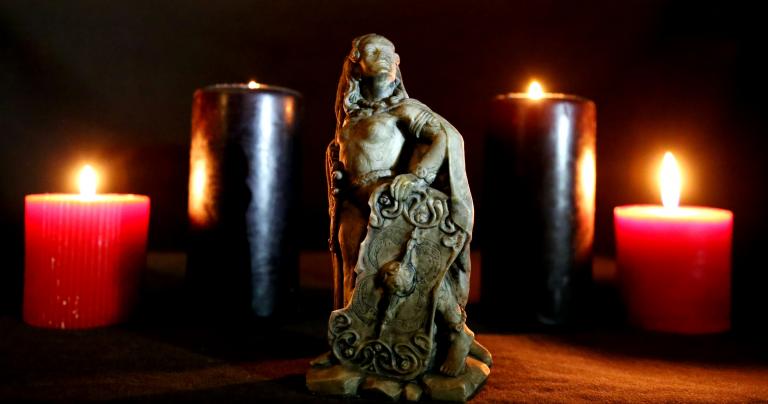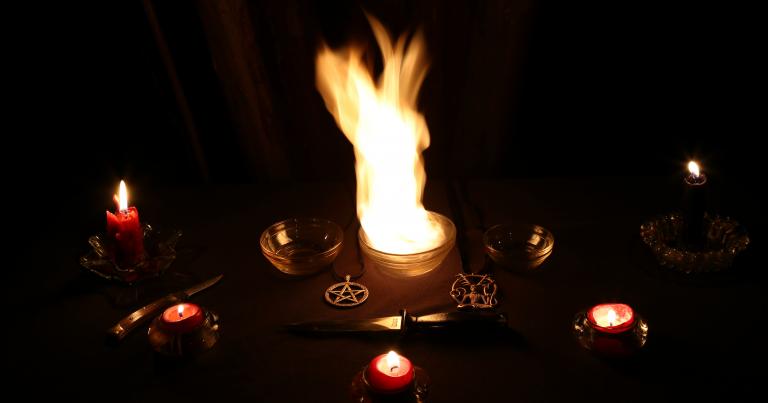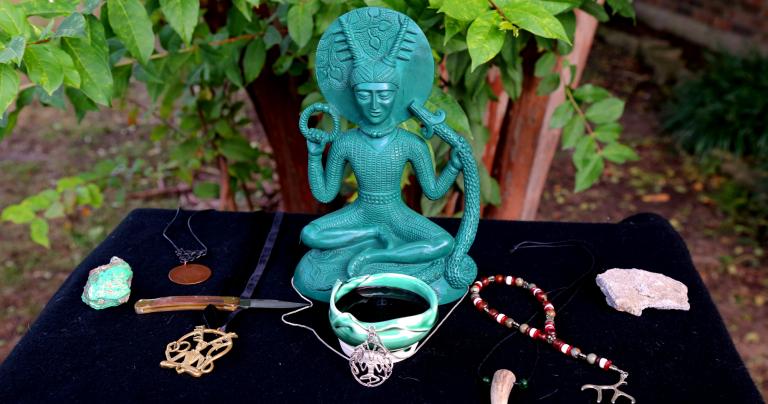In the recent post Paganism Isn’t Safe: When Rituals Scare You I made it clear that the Gods are mostly patient with beginners and that you shouldn’t be afraid of offending Them out of ignorance or because you need some time to process new and strange experiences.
Emphasis on mostly.
Most people can tell a God “no” and go on about their lives. The deity in question may be persistent and even demanding, for a while. But eventually They move on to someone else and the person in question has lost nothing more than an opportunity. That opportunity may have been life-changing and they may later regret turning it down, but perhaps not. We have the right to make our own choices and we’re responsible for living with the consequences.
Of course, I’m talking about most people. Most of the time.
Not everyone.
Because when it comes to serving the Gods, not everyone has a choice.
Sometimes the Gods take what They want.
And sometimes what They want is you.
I’ve danced around this topic for years and never directly addressed it. The closest I’ve come was Am I Hearing a God or Am I Going Crazy? in 2017. But that post dealt with what to do if you find yourself suddenly claimed by a deity, and it assumed that saying “no” is at least a possibility.
But start talking to polytheists and it’s not long before you hear people telling you “I didn’t have a choice.”
Most approach it in a matter-of-fact manner. “I was claimed, I realized that fighting was useless, and so I said “yes.” I have no hard data, but I would say that most are OK with how things are working out for them. Some are truly happy with it, while others are satisfied with the ends but still upset with the means. A few are angry and resentful.
All of them have the same question: “why?”
Why do most people get a choice and they didn’t? Why weren’t they greeted and welcomed and then nurtured until they were ready? Why were they thrown in the deep end of the pool without first being taught to swim?
I think these questions are worth contemplating. Even if we can’t come up with a definitive answer, we can dismiss some of the bad assumptions and weak explanations (some of which are highly offensive) I frequently hear in the Pagan community. Eliminating the wrong answers gets us a little closer to finding the right ones.
A question too important to be agnostic
When contemplating questions of why the Gods do this or that, the only thing we can say with certainty is that we don’t know. But the fact that we can’t know with certainty doesn’t mean we should abandon the questions.
I see this attitude a lot in regards to the most basic religious questions about the existence of the Gods or an afterlife. People say “I don’t know and I’m OK with that.” While I appreciate their honesty and I accept their words at face value, I can’t accept that position. Agnosticism is one thing. Agnosticism plus apathy is another.
You can only say “I don’t know and I don’t care” about something that doesn’t matter to you.
If you don’t care why the Gods sometimes claim people against their will then either you believe such things don’t happen, in which case you’re ignoring the first-hand accounts of those who’ve experienced it themselves. Or it hasn’t happened to you or anyone you know and so you haven’t given it any thought.
If you’re not a polytheist there is so much foundational work between you and the material in this post that last paragraph doesn’t apply to you. If you are a polytheist, I ask that you give it due consideration.
Because some of our fellow polytheists experience this… and someday you may be one of them.
No, you don’t always have a choice
One of the most annoying things I hear (though more from the New Age crowd than from Pagans, much less from polytheists) is the whole “you create your own reality” garbage. As if anyone would willingly “create” poverty, disease, and abuse for themselves and their loved ones. And while our individual choices do have consequences, they’re made within a socio-economic system that is set up to favor the few at the expense of the many and to the detriment of some.
In the argument of fate vs. free will, I come down strongly on the side of free will. But the choices we have (regardless of which ones we make) are limited by the structures and systems in which we live. You can choose to not pay taxes – let me know how that works out for you.
The Gods are older, stronger, and wiser than any human. They are more. If They want something They can take it – even if that something is you. Your “choice” is to go along with what They want, or deal with their wrath.
That’s not much of a choice.
The ethical dilemma this presents
Let’s be blunt: for some of us, this is very reminiscent of abusive parents, partners, or law enforcement officials. The excuses made by and for these abusive persons (“it’s for your own good” “he really loves you” “you have to respect authority”) don’t hold any more water when it comes to the Gods than they do with humans who belong in jail.
And, the Gods are always virtuous.
Last year I looked at the difficulties modern Pagans and polytheists have with some of the stories of Gods Behaving Badly. ADF priest Rev. Lauren Mart added her advice based on her own experiences. But as helpful as the ideas presented in these two posts can be, they primarily deal with the stories told about the Gods in the past.
This isn’t the past. These aren’t stories. These are divine beings doing things here and now that offend our sense of right and wrong.
I completely reject the idea that “They’re Gods so They can do whatever They want” or “who are you to tell a God what’s right and wrong?” That way lies Calvinism and its many ills.
I completely reject the idea that “They know that deep down you really want to do this.” Those are the words of a rape apologist.
All I know is that the Gods are virtuous, and sometimes I see Them doing things that appear unvirtuous. I do not have a resolution for this dilemma.
Four ideas to think with
We’re used to thinking about various concepts and situations. This is one of those times we need think with ideas – not to dissect and analyze them, but to accept them and contemplate them and see where they lead.
- Paganism teaches us that humans are part of Nature. Not the center and not the head, but one part. We are creatures of inherent worth, but we are one species among many, worth no more (and no less) than any other species. What is true of us as a species is true of us as individuals.
- Many of us are fond of quoting the line from Star Trek: “the needs of the many outweigh the needs of the few, or the one” – especially when the question is taxing the rich to provide for the common welfare. But when it’s our turn to be “taxed,” even in an area where we ourselves are relatively rich, we often cry theft.
- Before the internal combustion engine, horses were perhaps the most common source of power for farming and transportation. A farmer may respect, value, and even love his horse, and give it the best of care. But he’s still going to hitch it up to the plow and force it to work in the fields all day.
- The Gods are enough like us that we can relate to Them and form relationships with Them. But these are not relationships of equals. They are more than us… so much more that humans discussing the nature of the Gods is like cats discussing the nature of humans. What do They know that we can never understand, not because we don’t have enough information, but because it’s beyond the capacity of our brilliant but still limited minds?
A curiosity for some, a daily reality for others
These four ideas are not undeniable facts that lead us to an inescapable conclusion. I can’t distill them into a proper hypothesis, much less a defendable theory. But taken together they point us toward a greater reality, even if as horses we don’t like it and as cats we can’t understand it. I encourage you to contemplate these ideas in the context of this dilemma and see where they lead you.
And I strongly encourage you to remember that we are discussing this from a position of relative comfort and safety. Some of our fellow polytheists do not have this privilege. For them, this is their lived reality. For them, the question of why is of far less importance than the question of how to deal with a God who has claimed them and given them no say in the matter.
A point of no return
Most of us will never have to deal with this. But any of us can find ourselves in a situation where we can no longer refuse what is asked of us.
I once refused an offer from the Morrigan. That refusal had consequences, but it did not end the relationship. Danu made a rather blunt request/demand of me – I never considered turning Her down. Perhaps I could have walked away from Cernunnos, though given our long history together I tend to think not.
All of that was years ago. Now I have sworn oaths. Beyond my formal commitments, I have set precedents that in Their eyes are just as binding. I could not abandon them and their work even if I wanted to.
To be clear – I don’t want to. But it is not my continued desire that keeps me bound to my Gods. It is the bonds I have made.
Unlike those who were forcibly claimed, I had a choice. But having made my choice, I cannot simply change my mind. Perhaps I could negotiate a change of terms or even a complete release. But I tend to think not.
There was a time when a person’s word was their bond. When dealing with the Gods it still is.
This too goes against contemporary ethics.
More ideas to think with.
The polytheist future and the present reality
Perhaps someday we will have a Doctrine of Divine Claiming that will satisfactorily explain why Gods of virtue sometimes do things that seem unvirtuous. Perhaps someday we will have a network of temples and priests that will help those who are claimed to adjust to their new life and support them as they figure out how best to respond.
Today, all we can do is to recognize that when it comes to serving the Gods, not everyone has a choice.
Sometimes the Gods take what They want.
And sometimes what They want is you.




















